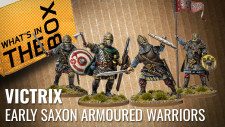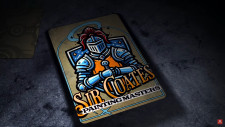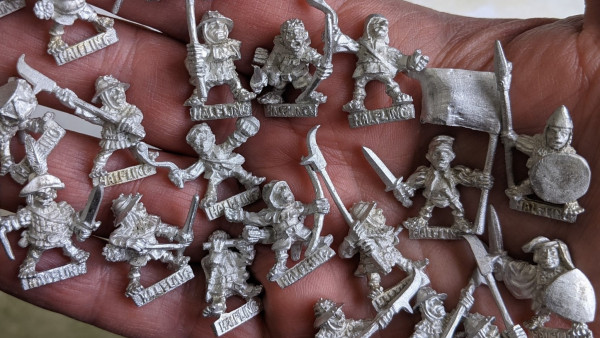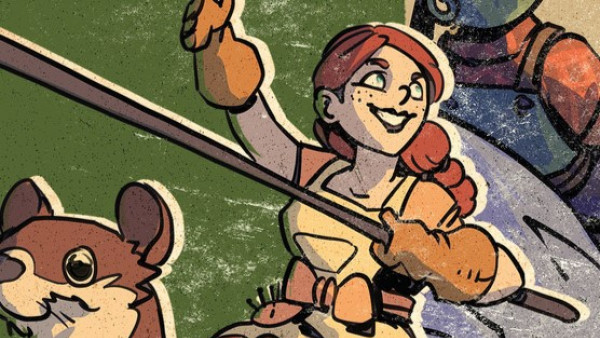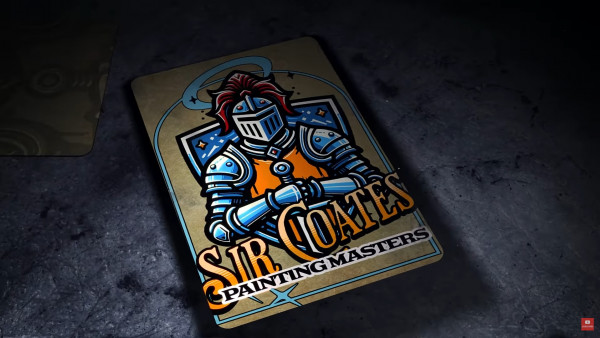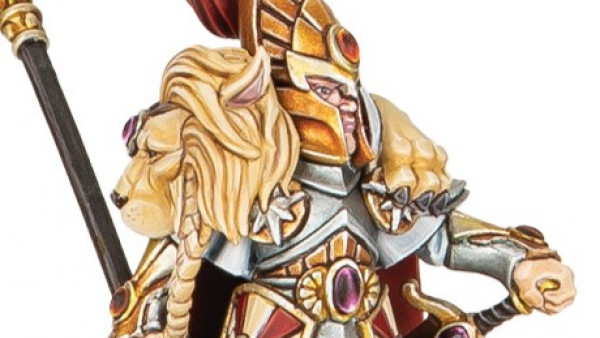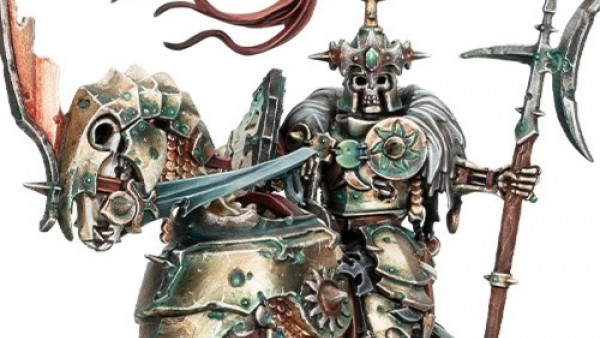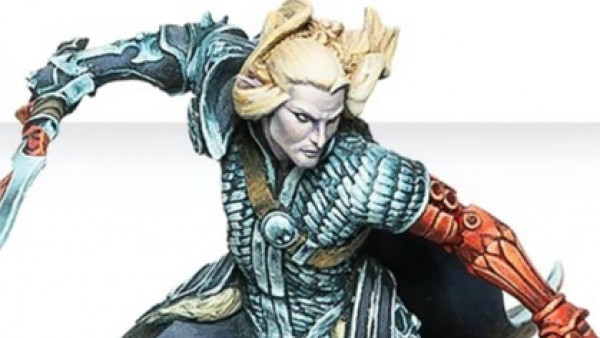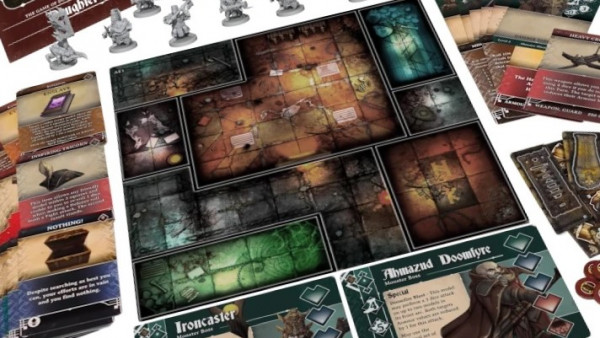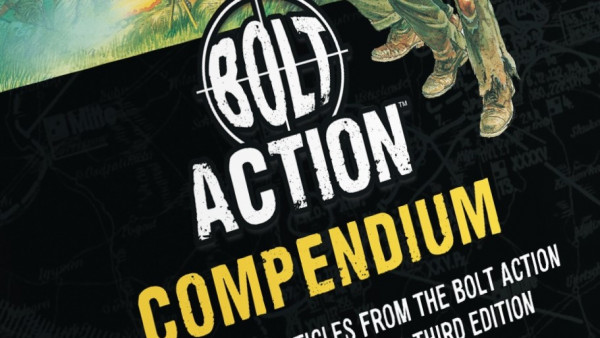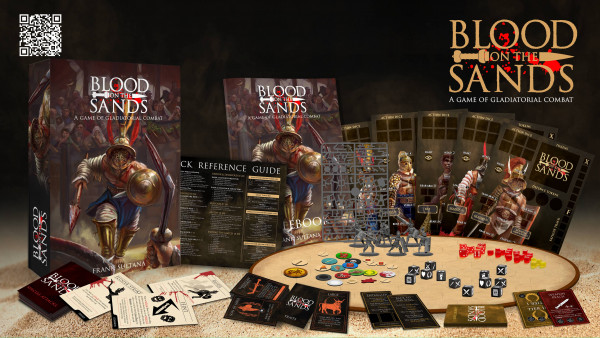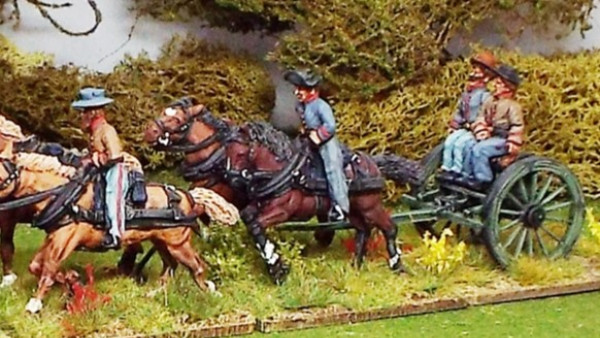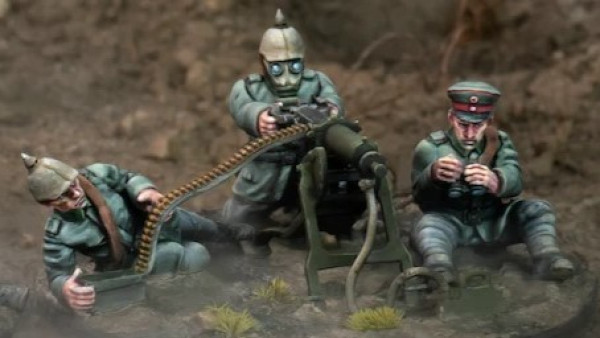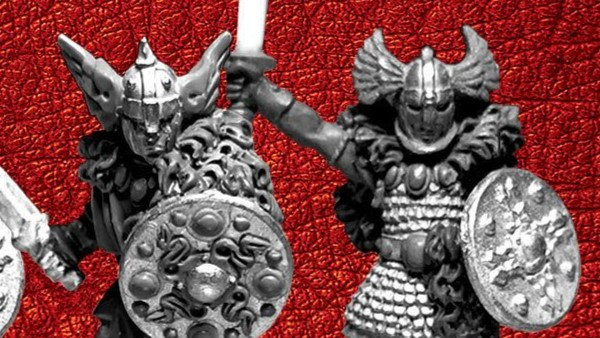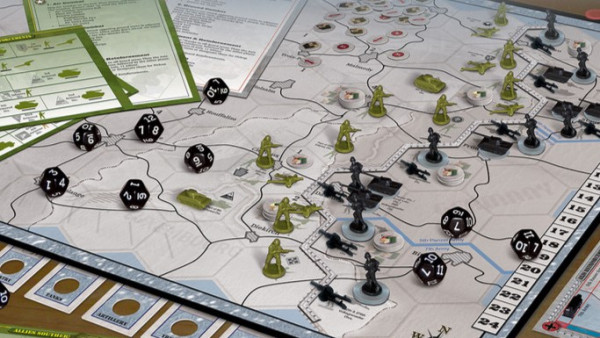Home › Forums › News, Rumours & General Discussion › Can RPGs learn from Wargaming?
Tagged: game design, rpgs
This topic contains 20 replies, has 11 voices, and was last updated by odinsgrandson 2 years, 10 months ago.
-
AuthorPosts
-
February 21, 2021 at 10:29 am #1614158
Story Time! tl;dr down below.
So, my friends and I had a discussion lately and I thought I would put up a thread here as I know many people here dabble in the old role play as well as tiny fighting men.
This all started with a discussion about the pros and cons of static defence versus a roll-for defence (at the time we were comparing D&D 5e, the system we have been playing in lockdown because it well supported in the digital realm and Ironclaw, a system we all love mechanically but is rarely heard of) and we came to the conclusion we generally prefer the roll-for type of system as it adds more variance and dynamism rather than the classic AC system of D&D.
And the someone asked “But what about ranged attacks? How do you Dodge a bullet like a melee attack? Even an arrow travels pretty damn fast.” Well that got us thinking.
Now: Ironclaw (as mentioned above) separates the have-you-been-hit from the did-it-get-past-your-armour-and-hurt-you bit and, some of us being wargamers, it wasn’t long before we drew the parallels between that and your classic hit => wound => armour save rolls in a lot of popular war games. After all, what is trying to beat an AC of 15 in D&D but a 15 up to hit on a D20.
Could you do something similar in RPGs for ranged attacks? Start with some static value that all ranged attacks must pass to hit (say the shooters skill or some basic static value, depends on what system you are using) and begin adjusting from there? Increase the difficulty for cover, or impose increased difficulty for special tech/magic/whatever-you-have? Reduce the difficulty for particularly large targets?It wasn’t much longer before our conversation was down into the nitty gritty of how high or low you set that initial target to reflect how deadly a gun should be or whether it would turn any encounter to hiding behind solid cover as soon as someone pulled a gun.
Lets put that aside for the moment as I am more interested in what people think of the principles behond the notion.
tl;dr Just presuming it was written to be balanced within your chosen system and doesn’t involve spreadsheets to calculate the final value (looking at you any 40k RPG written by Fantasy Flight)…
- Do people think that rolling to dodge weapons fire in RPGs doesn’t feel right?
- Could you make it a more static test of can the shooter hit the target?
- Would it make more sense the target to have to use their environment to impose against the shooter?
- Are you just playing a wargame at that point (Frostgrave? Rangers of Shadowdeep)?
- Do people like their, no it is a RPG and my character is dodgy so I dodge nature of such typical systems.
- What else could RPGs learn from wargaming? What other principles would you like to see make the cross over?
Let the thoughts and discussion flow.
February 21, 2021 at 11:49 am #1614191given that D&D started life as a modification of the chainmail wargame rules … of course there’s parallels to be had.
I’d argue that a system like that is over complicating things for the sake of making things appear more realistic.
The key questions to answer are always these :
- do I hit him
- how much damage do I do
You can split that first part into all sorts of rolls for ranged attacks (and they have their equivalent for melee combat too) :
- do I see him
- does my arrow hit the target
- does it penetrate his armour
- can he see/notice it at all so he could dodge it ?
- does he dodge it ?
And for damage you’d probably break it down into
- how much potential damage do I do
- how much does his armour absorb
- how much does his natural armour absorb (ie : is there a minimum threshold ?)
Breaking it down like that would have the advantage of being able to tweak the statistics perfectly.
However when the net statistic ends up to be x% regardless of whether he has armour or he dodges or a combination of both … it adds more effort for very little reward. And that is if you can automate the heck out of the charts/spreadsheets required to calculate the target numbers so players don’t have to do that part …I admit that it does feel more satisfying to know that your defense doesn’t depend on a single roll of the dice.
And the same thing is true if you’re trying to make a low probability shot that initial feeling of ‘I got this’ is kind of cool.
However at the opposite end you get the “this should be easy … why am I still rolling dice / why did I fail that final roll” thing that can annoy the heck out of you.The only reason you’d want to know if a ranged attack hit is if there are any effects that need explaining.
Does the armour degrade ?
Does getting hit with certain projectiles matter ? (damage to armor or sneaky poison that seeps under your armor ?)IF there is a thing that RPG’s could learn from wargames it is that you shouldn’t over engineer combat related systems.
The detail is nice if you’re at the final duel with the evil boss.
It sucks when you’re fighting your way through dozens of his minions and would want to resolve this before the next decade.Heck … I think there are a few things that wargames can learn from RPG’s : the concept of minions (who ‘die’ as soon as they get hit) vs bosses (who can take a bit more damage). Time saving mechanics / rules to use when ‘minor’ elements are engaged in conflict so you can focus on the ‘important’ bits …
February 21, 2021 at 12:13 pm #1614198I would argue that even at level 1 to take AD&D for example a character is a cut above the rest of the population so dodging arrows etc should be an allowable thing
I still like the old THAC0 system. Simple and effective and quick
February 21, 2021 at 4:30 pm #1614315@limburger Very true, that was one of the things I actually did like of the mess that ended up being Wrath & Glory: the idea of minion enemies that are just in a group and can be attacked as a group. Part of the stat block sets a defense value and extra successes means extra hits so a half decent roll can have you taking out multiple minions rather than fighting them all one by one. You then got a level above that which were individuals to represent bigger/more impotant threats that ate played more like typical rpg enemies.
I do agree that breaking to lots of rolls is just busy work, I would be more inclined to modifying the target for a just one or two rolls else you end up taking forever to resolve even the simplest action.
@torros That’s interesting, one of the points we couldn’t come to a satisfactory conclusion on was “Should arrows and bullets be treated as the same type of shooting attack?” Though how many systems have to contend with both being a viable option? Perhaps we like to ocerthink things. =P
I’ve heard of THAC0 but never gotten my head around it as it was before my time. Perhaps worth my interest to go read up on it.
February 21, 2021 at 8:07 pm #1614349- Do people think that rolling to dodge weapons fire in RPGs doesn’t feel right?
- Could you make it a more static test of can the shooter hit the target?
- Would it make more sense the target to have to use their environment to impose against the shooter?
- Are you just playing a wargame at that point (Frostgrave? Rangers of Shadowdeep)?
- Do people like their, no it is a RPG and my character is dodgy so I dodge nature of such typical systems.
- What else could RPGs learn from wargaming?
- What other principles would you like to see make the cross over?
There isn’t really any right answer to any of these. I have recently seen a discussion on an Infinity Facebook group about the Infinity RPG and people are complaining about “abstract combat” and an “abstract money system”. All dice rolls in all games an abstraction not a simulation so they won’t ever feel “right” as such, they will only meet a personal preference, or not. Questions like should a characters roll to dodge bullets? Well, why not? The first question you have to ask is should dodging bullets, regardless of how it is abstracted into a game mechanic, be possible at all? You have to decide what it is that you are trying to simulate. Is it the Matrix where some stands on the spot and apparently flails their arms around or is it someone being possessed of quick reflexes and a sharp eye noticing that they’re being lined up for a shot and diving out the way fractions of a second before the trigger is pulled. It may be both or neither depending on the setting of the game. Once you have made a decision whether a particular action should be allowed in the game you can ask the question is it an active action or a passive action
- Passive – occurs automatically without requiring any action by the player.
- Active – player elects to do the action
Then how does the effect manifest? Is it a stand alone roll, is it a versus roll or does it just confer a penalty/bonus?
- Stand alone – player rolls against a pre determined target and this target is not affected by their opponent
- Versus – both attacker and defender roll against the other to see who gets the best score based on whatever mechanics are in use
- Penalty/Bonus – the action requires no roll and either provides some numerical bonus to the player taking the action or provides a penalty to the attacker.
Whilst dodge is the example given the above applies to pretty much everything in both RPGs and Wargames. The dice mechanic is not a simulation of reality it is an abstraction of it, a means of determining whether a stated action is successful or not.
Don’t get me wrong, there’s some really, really bad abstractions out there and the most popular RPGs in the world (D&D and Pathfinder) are absolutely full of things that don’t really make any sense. And in most games you will find at least one thing that makes you raise an eyebrow. But at the end of the day the rules still serve their purpose
I don’t really think RPGs can learn anything specific from wargames or vice versa. I think, however, there’s some very clever and fun mechanics in use in lots of game of both types that could be fun if ported into other games but that probably cuts both ways
February 21, 2021 at 8:55 pm #1614374I think the old WoD had a very good system for this.
First off: I don’t think dodging ranged weapons is unfeasible. I don’t see you dodging a bullet, but increasing the shooters difficulty to hit. Once the bullet is fired, it’s already gonna hit you or not. Dodging is done at that point.Now WoD has long been my groups system for basically any type of campaign imaginable. We played sci-fi, pulp, western even some Vampire. It feels realistic and had enough flexibility to be cinematic.
Range, cover, the weapon used and such dictate the target number to be rolled for any attack. The target, if he/she has actions left, may use these to counter your attack. This could be a parry or a dodge. Each has a dice pool and rolls. The one with the highest number of successes win. Weapons have a set number of damage dice and the target gets a “save’ based on toughness and armour and the like.Recently we’ve picked up 5e (We played 2e way back). It’s gamey. It’s feels a bit like a wargame to me. Character build and characters use their abilities in synergies and combat is rather abstract, but faster. Not a bad thing per se, just a different way of playing. But it does feel a bit like playing Warma-hordes to me. I like it. It’s a change of pace.
So can an RPG learn from a wargame. It depend on what your going for. My wargaming buddy and me have been introducing mini’s to the rest of the group (who only play rpg’s and the occasional board game), with mixed results. Most like it, but wish to keep it abstract. It’s easier to keep track of who’s where and facing what, but I really don’t have to get the rulers out.
So what does you group require. I think the best thing about RPG is to house rule the hell out of them. If you think something’s cool, run it passed your group.
But there’s not really a hard answhere to this question, I think.February 21, 2021 at 9:22 pm #1614377I think this echoes a fair bit of what o have been catching up with in the “Why don’t we have the perfect wargame yet” thread that was started fairly recently. Everyone is looking for something different and when you emulate you have to pick what you want to hold to and I agree that is a practical.
@onepinman I have to concur that there is no right answer to any of these questions and I apologise if I gave the impression there sbould be one. I believe that does a diservice to engendering discussion around what could be an answer, which is more interesting as I see it. =3
@darkvoivod House rules are the key to a good RPG I feel and I suppose the same can be said for wargames when you have a close group. No one is likely to wrote the perfect game for everyone but ignoring bits that your group finds tiresome or tweaking/adding bits in where they are more interested is in service of a better game. Afterall, what is writing your own ruleset but one big set of house rules? =P
To paraphrase Uncle Atom, “its your game, you should play it they you want to play together”.
February 22, 2021 at 12:03 am #1614425Perhaps, but I am unsure what the specific question is, it feels like there’s lots of questions, which is quite hard to track as a discussion. I can see 4 possible “themes” to the questions.
-
<li style=”text-align: left;”>Can RPGs learn from Wargames?
- Should you be able to roll to dodge ranged attacks in RPGs?
- Do I like the Dark Heresy dodge mechanic?
- What wargaming principles should we transfer to RPGs?
To answer them in order. Can RPGs learn from wargames? Yes and vice versa. But not universally, some games could benefit from using some rules from other games and that’s definitely bi-directional.
Should you be able to dodge bullets/shooting attacks in an RPG? sure, why not.
Do I like the dodge mechanics in Dark Heresy? Not sure, it’s been a long time since I played it and without playing it again I can’t really comment on that.
What wargaming principles should we transfer to RPGs? Honestly? None. I think you can borrow occasional rules between games but there are no principles offered by wargames that are lacking from RPGs that need to be “learned”. RPGs and wargames are both doing just fine as they are
February 22, 2021 at 12:21 am #1614438dodging bullets ?
ha ha … nope … unless the bullets travel at the same speed as an arrow … and even then you need super human awareness and above average skill.
But hey … if you decide it is possible within your setting then do your thing 😀
@onlyonepinman mentions a very important bit : active vs passive abilities.
Dodging stuff would be a given when you’re under attack as you’d have to be insanely stupid/brave to walk in a straight line.
Even in close combat that question can be abstracted away, because some combat techniques may simply lean more towards dodging stuff as opposed to getting a thick skin ….Parrying attacks is kind of silly when the same system accepts that using your shield is ‘standard’.
I used to think that you needed a specific test/skill check for every possible attack … but that sort of thing only ever makes sense if you’re playing Street Fighter RPG and every battle is a simulation of the videogame. It does help players be a bit more creative in combat as they don’t have to go “I hit them with my sword” every round … but at the same time the added detail is more of narrative use as there would have to be a never ending discussion about which offensive technique is best against any given defensive stance/technique.I suppose the fact that rpg’s tend to mix various levels of abstraction is what makes these systems confusing and less coherent.
I’d argue that money is an abstract thing in all RPG’s because you rarely have to pay your monthly bills or the cost of your room at the inn in the vast majority. As such it is kind of silly to declare a that a sword is worth X gold pieces …
I doubt most games have a functional economy when you start looking at the mechanics of dungeon exploring and its effects on the world.
February 22, 2021 at 6:36 am #1614510Dunno about the rest of you, but I’ve always thought that roleplaying games were about *roleplaying* not *roll-playing*.
I don’t think RPG’s can “learn” anything from wargaming, unless a wargaming session tells a *story* that affects the character’s lives. I’ve seen rulesets that allow you to play your RPG character in an army battle. You’d think that some guy wielding a sword and cutting down orcs should be in an army, but, nope, there he goes down into a dungeon again.
But something I’ve noticed about RPG’ers is that they want adventure, not tactics. With D&D 4e, I had a paladin cut down by goblins and wolves because he didn’t know what flanking was. Pretty reasonable in hindsight, since his degree was probably more IT-related than anything else.
February 22, 2021 at 9:01 am #1614545@limburger why not dodging bullets? Superhero games, cyberpunk games with augmented reflexes etc. There are many reasons why dodging bullets might be possible in an RPG. But even discounting those situations, if you have dodge as an action/reaction in a game and you can use that action against a ranged attack then you are in fact dodging bullets. The narrative of how you dodge those bullets is entirely up to you to explain.
I don’t really think there’s any one size fits all solution to how that mechanic should be implemented, it only needs to be consistent with the rest of the game and you kind of have to just accept that it’s not intended to simulate real life, it’s an abstraction intended to give you a non-deterministic means of deciding whether an action occurs or not. You can break each scenario down into as many or as few dice rolls as you like. So in the example of an attack you could break it down into a single roll – attacker rolls a dice and the attack either succeeds or fails with no input from the defender, any defences the defender has are factored into the attack roll – this is essentially like D&D. Or you can make it so that the attacker rolls to hit, then the defender can roll for defences such as armour or dodge or both – this is more like Dark Heresy. Which you prefer is entirely down to you, neither is right or wrong however in both cases the narrative should be identical. It should work something like this:
- Attacker declares an attack
- Rolls are made, whatever they happen to be
- Outcome is determined
- GM describes how the events unfold
The same steps are followed regardless of the specific mechanics or how many dice are rolled
February 22, 2021 at 12:35 pm #1614627@onlyonepinman I meant that if dodging is going to work within your setting then you’ve got to know what the limitations are.
Do you need to sense the shot getting fired ? How accurate do you have to be ? At what ranges is it viable/acceptable ?
What abilities do I need ? Is it something limited to specific species ?It basically boils down to being able to tell why their dodge can or can not work, so you don’t get caught when your story/adventure relies on an (N)PC (not) getting hit at a critical point.
You can always decide as a GM that feature/rule X does not apply when convenient for your benefit, but that’s the kind of stunt that breaks immersion if it happens too often.
It’s kind of like the Horror movie trope where the bad guy never really dies so they can make a sequel …
//
If RPG’s can learn anything from wargames it is that all sides play by the exact same rules and restrictions all the time.Creating a dramatic scene where you rely on specific dice roles for it to happen is *eh* tricky unless you either cheat or accept that things don’t always happen according to your plan even if you are ‘god’ within the setting.
Example : a npc getting shot and dieing in the arms of the pc’s so you can arrest them for murder …This is also why designing historically accurate scenarios for wargames can be tricky …
February 22, 2021 at 1:01 pm #1614639Most RPGs I have played have mechincs for things like surprise whereby if you are unaware of an attack you suffer penalties and/or your attacker gains advantages. One of those might be that you lose your ability to dodge. They also usually define if/when certain abilities can or cannot be used. Ultimately it doesn’t really make any difference as long as the rules are all internally consistent – you can always make a case both for an against an action being usable in any given context. I don’t see any reason why dodge cannot be used at point blank range, at that range you are virtually in melee combat anyway however you would also expect there to be some additional bonuses to the attacker at point blank that would actually make dodging more difficult. I am not saying that there are no bad games mechanics out there, maybe in some games the dodge mechanic isn’t particularly good, but in and of themselves they don’t represent a case for RPGs in general needing to learn from wargames, they’re just an example of a bad rule. Pretty sure if you look at any wargame you will also find some rules that don’t seem to make any sense. Personally I think the family of D20 system derivative games (D&D, Pathfinder etc) has built its entire reputation and silly mechanics, things that have been wrong with the game since its inception, but people still love it and ultimately it still works as a game
I would also argue that in an RPG all sides should not always play by the same rules. The GM is responsible for what happens regardless of the dice rolls and there’s some very good reasons why, as a GM, you might actually play by the rules and might want to bend them or fudge them, especially if you realise that you have either over or under estimated the players abilities or they’re just having a bad day with the dice. The GM’s job is not to make a fair fight but to tell an interesting story and what goes on behind the GM’s screen stays behind the GM’s screen.
In some games the GM and the players don’t play by the same rules at all – in Symbaroum for example the GM makes no dice rolls at all, every action is driven entirely by the players. When the baddies attack a player, they roll defence with modifiers based on the the attackers’ abilities.
February 24, 2021 at 11:06 am #1615954Whilst I think the ideas in this thread are great, reading it all I could think was, 4 out of the six people in my regular group wouldn’t give a monkey’s about this. That includes two others who are into wargaming. Honestly the issue remains the same as the eternal battle between rules heavy and rules light systems – unless you have a group that wants it, it’s a waste of effort. To use the “world’s most popular role playing game” or whatever their tag line is these days as an example. The vast majority of 5e players will not play 3.5 and vice-versa. Our group have played together for over a decade but there are players who played 3.5/Pathfinder who no longer want something that complicated. Between working for home, homeschooling, looking after elderly parents and all the real world obligations, they enjoy turning up for a few precious hours on a Thursday and telling great stories together. So the rest of us play 5e.
in that case the abstraction of things are harder to hit with higher ac or cover rules is enough for satisfaction. There have been changes to the ways hits work in Pathfinder 2 and several members of our group were put off because it was “less fun to roll dice”.
February 17, 2022 at 4:27 pm #1716954Ive always just wished D&D would just change the wording of few things to help better understand what the mechanics are actually doing.
The biggest problem has always been the “To Hit” roll. “To Hit” implies striking the target, which is entirely not what you are doing at all. Which leads straight into the players referring to attack rolls as “hits” or “misses”. Which again does not have any bearing on what just happened in the game.
You are rolling to bypass ALL defenses the target has, whether you actually strike/hit or not doesnt have a bearing on the roll you just made.
When I explain it to new players I call it a “To Damage” roll (or sometimes I call a “To Wound” roll). You are rolling to see if you “damaged” your target. If you succeed you have damaged the target and can now roll that damage and see how badly the target is “damaged”.
The Attack roll truly is a “To Damage” roll. If D&D just called it that in the first place, you would get alot less problems.
The other is of course AC. Just get rid of AC all together and call it “Defenses”.
-
AuthorPosts
You must be logged in to reply to this topic.

































